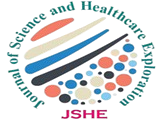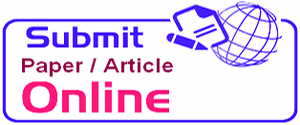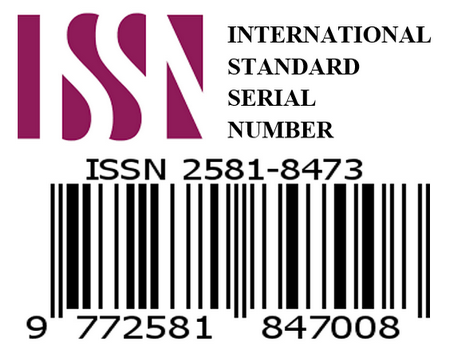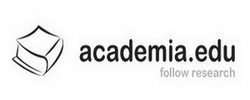Duties and responsibilities of authors
Authors and Co-authors:
Authors are advised to follow the guidelines and code of ethics strictly. Submit manuscripts which are their original works or of the work they are associated with during their tenure. Submitted manuscripts should contain original and new results, data, and their ideas, which are not submitted for publishing to other publications or published elsewhere. Fabrication of data and results, intellectual property theft and plagiarism are highly unacceptable, it is beyond the ethics of an author. Information obtained via various media should be provided in the manuscript only with prior permission from the owner of the source of information or data. They should properly cite the work they are referring, authors are advised to cross check the reference before submission of manuscript. They may not promote in any form via any media to get their works published. No article should have an author who is not directly involved in the work for any means or reasons.
Authors and co-authors are requested to review and ensure the accuracy and validity of all the results prior to submission. Any potential conflict of interest should be informed to the editor in advance. Authors are bound by the Creative Commons licensing policy of publication. All authors are requested to submit the copyright transfer form without failure once they receive the acceptance of their article for publication.
Publication and Submission fee
No fees or charges are required from authors for manuscript submission. Authors pay nominal publication fee after acceptance of paper / article to maintenance cost of website and expenses of editorial office. Full information about publication fees clearly stated on the journal´s website, author can easily refer it before submission.
Open Access Policy
The journal is freely available online. Authors are required to agree with this open access policy which enables unrestricted access and reuse of all published articles. The articles are published under the Creative Commons copyright license policy CC-BY-NC-ND. Users are allowed to copy and redistribute the material in printed or electronic format and build upon the material, without further permission for non commercial use.
Reporting standards
Authors of papers should present an accurate account of the work performed as well as an objective discussion of its significance. Underlying data should be represented accurately in the paper. A paper should contain sufficient detail and references to permit others to replicate the work. Fraudulent or knowingly inaccurate statements constitute unethical behaviour and are unacceptable. Review and professional publication articles should also be accurate and objective, and editorial opinion works should be clearly identified as such.
Data access and retention
Authors may be asked to provide the raw data in connection with a paper for editorial review, and should be prepared to provide public access to such data (consistent with the ALPSP-STM Statement on Data and Databases), if practicable, and should in any event be prepared to retain such data for a reasonable time after publication.
Originality and plagiarism
The authors should ensure that they have written entirely original works, and if the authors have used the work and/or words of others, that this has been appropriately cited or quoted. Plagiarism takes many forms, from “passing off” another´s paper as the author´s own paper, to copying or paraphrasing substantial parts of another´s paper (without attribution), to claiming results from research conducted by others. Plagiarism in all its forms constitutes unethical publishing behaviour and is unacceptable.
Multiple, redundant or concurrent publication
An author should not in general publish manuscripts describing essentially the same research in more than one journal or primary publication. Submitting the same manuscript to more than one journal concurrently constitutes unethical publishing behaviour. In general, an author should not submit for consideration in another journal a previously published paper. The copyright remains with the authors (CC-BY-NC-ND), thus they can decide about eventual republication of their text. The primary reference must be cited in the secondary publication.
Acknowledgement of sources
Proper acknowledgment of the work of others must always be given. Authors should cite publications that have been influential in determining the nature of the reported work. Information obtained privately, as in conversation, correspondence, or discussion with third parties, must not be used or reported without explicit, written permission from the source. Information obtained in the course of confidential services, such as refereeing manuscripts or grant applications, must not be used without the explicit written permission of the author of the work involved in these services.
Authorship of the paper
Authorship should be limited to those who have made a significant contribution to the conception, design, execution, or interpretation of the reported study. All those who have made significant contributions should be listed as co-authors. Where there are others who have participated in certain substantive aspects of the research project, they should be acknowledged or listed as contributors. The corresponding author should ensure that all appropriate co-authors and no inappropriate co-authors are included on the paper, and that all co-authors have seen and approved the final version of the paper and have agreed to its submission for publication.
Acknowledgement of funding sources
Sources of funding for the research reported in the article should be duly acknowledged at the end of the article.
Disclosure and conflicts of interest
All authors should disclose in their manuscript any financial or other substantive conflict of interest that might be construed to influence the results or interpretation of their manuscript. All sources of financial support for the project should be disclosed. Examples of potential conflicts of interest which should be disclosed include employment, consultancies, stock ownership, honoraria, paid expert testimony, patent applications/registrations, and grants or other funding. Potential conflicts of interest should be disclosed at the earliest stage possible. Readers should be informed about who has funded research and on the role of the funders in the research.
Fundamental errors in published works
When an author discovers a significant error or inaccuracy in his/her own published work, it is the author´s obligation to promptly notify the journal editor or publisher and cooperate with the editor to retract or correct the paper. If the editor or the publisher learns from a third party that a published work contains a significant error, it is the obligation of the author to promptly retract or correct the paper or provide evidence to the editor of the correctness of the original paper.
Time Limitations for submitted Paper/Article or Research work manuscripts provisions of storage and responsibility in JSHE:
- As JSHE journal offers online website submission and Email submission of manuscripts / paper/ article or other research work files. If Author / Authors /Submitters do not complete the publication process by submitting copyright form, /conflict of interest form with processing charge proof copy within 60 days, it will be considered as auto removal or auto cancellation. Journal, Editors, Reviewers and Publisher are not responsible and liable for the submitted soft copy manuscript file and its contents or storage, Author / Authors /Submitters cannot claim to retain submitted paper/ article / research work / manuscript retain right or copyright reservation rights and cannot claim against Journal, Editors, Reviewers and Publisher in lawsuit.
Withdrawal/Cancellation of Published Paper/Article/Research work or manuscript provisions of the copyright in JSHE:
- If Author / Authors / Submitters want to cancel or withdraw the publication of a paper/ article / research work / manuscript file from JSHE they need to follow withdrawal policy and instructions of Journal. :- https://jshe.researchculturesociety.org/withdrawal-policy/
- By requesting a withdrawal letter – application to the Editor – JSHE, after withdrawal or cancellation approved by the Editor/Journal side. All copyright agreement and publication terms, publication and certificate will be auto cancelled from JSHE. Journal, Editors, Reviewers and Publisher are not responsible and liable for that withdrawal/ cancelled/ deleted file, certificate file and its contents or storage. Author / Authors /Submitters cannot claim to retain submitted paper/ article / research work / manuscript retain right or copyright reservation rights and cannot claim against Journal, Editors, Reviewers and Publisher in lawsuit.
The Managing Editor,
Journal of Science and Healthcare Exploration (JSHE)




